
- Home
- Grand Prix Artworks Gallery
- Past Grand Prix Artworks
- Lao People's Democratic Republic
Lao People's Democratic Republic
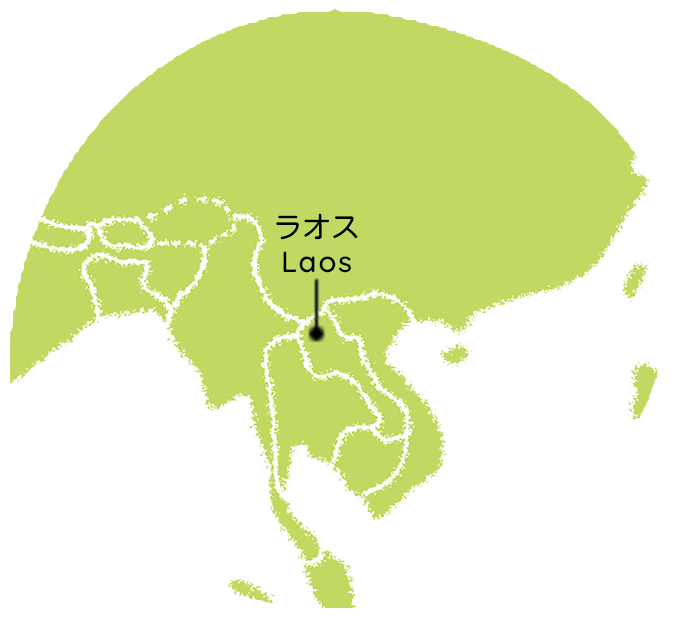
16th edition (2024-2025)
-
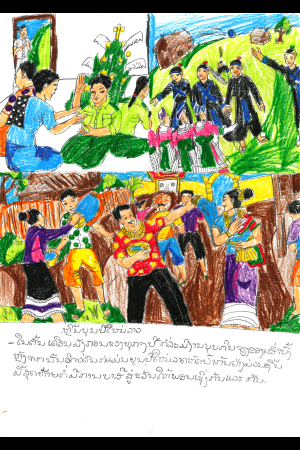
Celebrating the Lao New Year
We celebrate the Hmong festival of Kinh Giang every year in early January. Soon after that, we enjoy celebrating the Lao New Year. The celebrations end with exchanging gifts and good wishes.
15th edition (2021-2022)
-
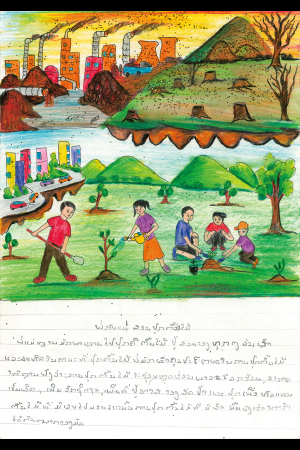
Learning tree planting from our parents
Our parents take us out into the garden each weekend to plant trees. Our father explains the benefits of planting trees. Planting trees is useful for preventing global warming and air pollution, for generating oxygen, and for creating habitats for wildlife. Planting trees is also valuable for replacing trees that we have lost. And if we plant fruit trees, we can eat their fruit.
14th edition (2019-2020)
-
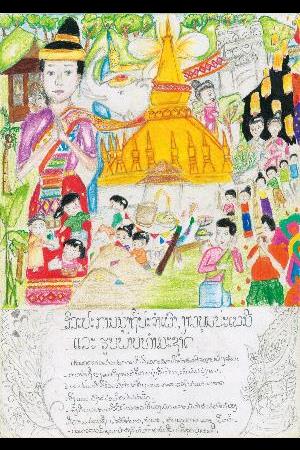
Ethnic apparel, traditional festivals, and nature photos.
Laos is a nation that has lots of interesting characteristics. Women wear silk skirts, hair bands, and sashes that they wrap over their shoulders and around their chests. My favorite tradition is the procession and the release of lanterns into the air at the Pha That Louang Buddhist stupa in Vientiane. I also like the traditional Lao New Year. It makes me happy as people give alms to monks, pour water on Buddha statues, pat sand, and splash water on each other. Laos has forests, which provide us continuously with fresh air.
13th edition (2017-2018)
-
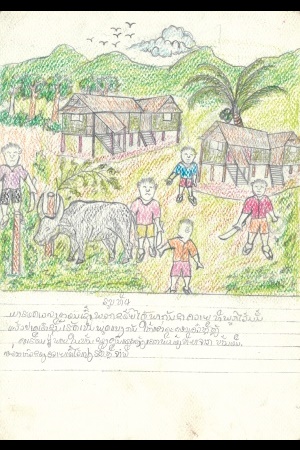
This is a drawing of my neighbors in the village of Tawery in the Toumlam district of Salavanh Province. They are preparing for a festival. The main features of this festival are two buffalo, some chickens, some alcohol, and a hut that we call a rah mong. The festival begins with the villagers walking to the cemetery at two o'clock in the morning to summon our ancestors' spirits home.
12th edition (2015-2016)
-
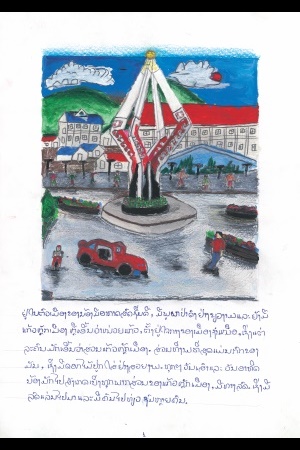
The city where I live is Xam Neua in the middle of Houaphanh Province. We enjoy green surroundings and fresh air. Keo Lak Meuang Park is in our city. That park has a statue of Keo Lak Meuang, a guardian spirit. The top of the statue is the most beautiful and important part. It has neatly planted flowers. I like to go to the park on weekends and look at all the parts of the statue. The park has a road where cars pass, and it's always crowded and lively.
11th edition (2012-2013)
-
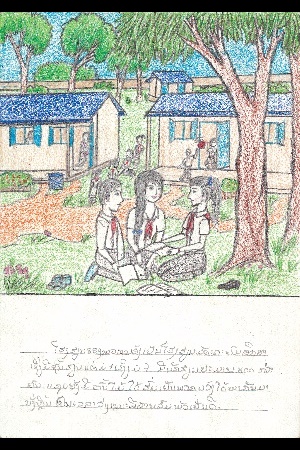
My school has seven grades and about 800 students. It has trees, which provide cool shade. We sit in the shade and play during recess. The breeze feels good.
10th edition (2010-2011)
-
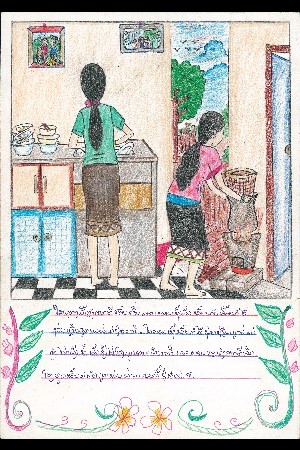
My sister and I help my parents with the housework every morning after waking up. I make a fire to cook the rice and then go to school. When I get home from school in the late afternoon, I help my parents again with the housework.
9th edition (2008-2009)
-
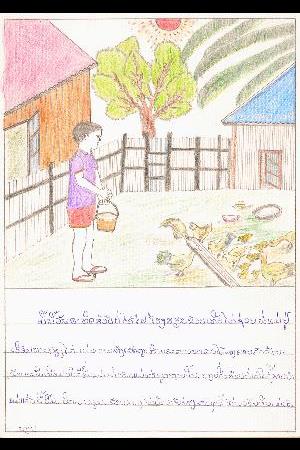
We don't have school on Sunday, and I help my parents to feed the chickens on our farm. Raising chickens contributes to economic development and earns money for our family. So I feed the chickens a lot, and lots of chicks hatch. I sometimes go with my mother to sell chickens, and I get to use some of the money to buy pens and paper for school. I like to watch a black and white chick running around its mother.
8th edition (2006-2007)
-
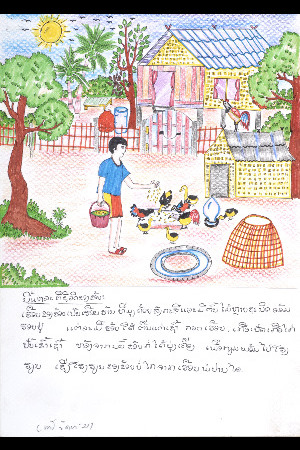
Here is my life
My house is in a cottage with a zinc roof. We have a lot of different trees around the house. I get up early to clean the house, feed the ducks and chickens, and have breakfast. Then, I change clothes and go to school near our house.
7th edition (2003-2005)
-
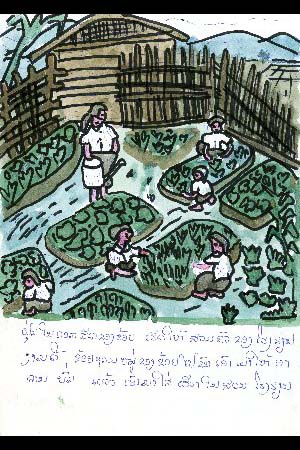
The vegetable garden at school is doing really well, thanks to natural fertilizer from my family's animal farm. I asked my friends to carry manure from our farm to the place the teacher said and to spread it over the vegetable beds after it fermented.
6th edition (2000-2002)
-
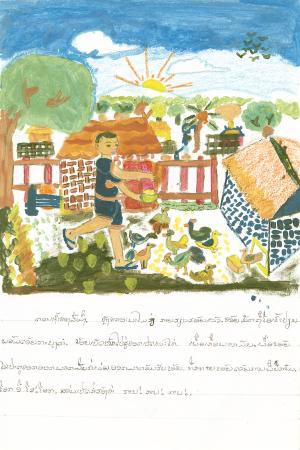
After I wash up in the morning, I take a bowl of cracked rice and a basket of bran out to the chicken house. The chickens come out to greet me when I open the door. They flap their wings and talk to me. The hens cluck and the ducks quack.
5th edition (1997-1999)
-
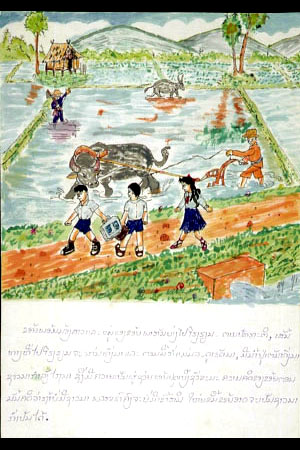
Like always, my younger sister, my friends and I passed by a paddy field on our way to school. Being the season for cultivation, the field was filled with water. The farmer was ploughing the earth with the help of his buffalo. I stopped for a while and thought. If it weren't for the farmers, we would not have any rice to eat. I thought that I can be a farmer when I grow up.
4th edition (1994-1996)
-
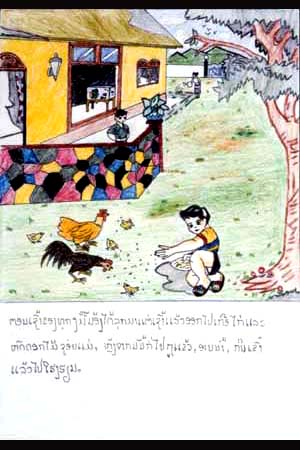
Every morning, I get up early to help my mother. I feed the chickens and water the plants. Then I brush my teeth, have my breakfast and go to school.
3rd edition (1993-1994)
-
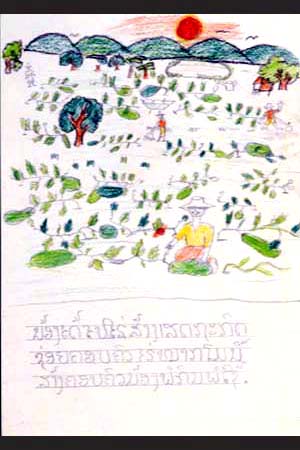
I help my parents with growing water-melon in the field. It constitutes the supplementary income of the family.
